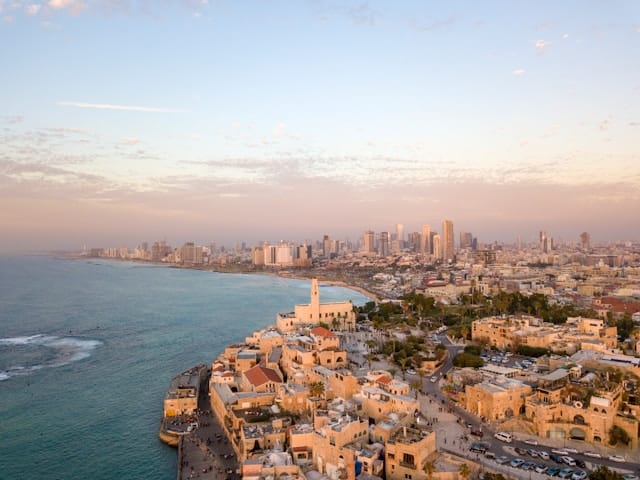6 Reasons Why Israeli Hospitals Are Just Like Summer Camp

About a month ago, I gave birth to my son, Dov, at Hadassah Hospital in Jerusalem. By this point, I’d been living in Israel for 3.5 years and was well-versed and comfortable with Israeli medical care. I liked my doctors, I knew the necessary terms in Hebrew (though all of my doctors spoke English), and I appreciated that each visit to my amazing gynecologist cost a whopping $6.30. Yup.
Yet, when my husband and I showed up at Hadassah for my c-section, we suddenly felt like we were medical tourists. Moving our lives to Israel was one thing. But allowing a bunch of foreign doctors to anesthetize me, cut me open, and bring my baby boy into the world felt like it went beyond the call of patriotism for my new country.
Israeli hospitals are a far cry from American hospitals–in cost, in service, and in what’s expected of the patient. But, as I relinquished my control, I realized that the environment felt more familiar than I’d thought: the maternity ward was remarkably similar to my summer camp. Here’s why.
6 Reasons Why Israeli Hospitals Are Just Like Summer Camp
1. Meals are served in the cafeteria
Just gave birth a few hours ago? Well, when they announce that it’s dinnertime over the intercom, you’d better get in line. All meals take place in a cafeteria and each woman–unless completely immobile–is expected to get on her feet and grab her own tray and food. Meals last for about 45 minutes, and if you miss it–say, because you’re breastfeeding or constipated–you’ll have to beg the tough kitchen staff for some leftover rations.
Most of the women showed up in hospital nightgowns, wheeling their infants wrapped in blankets and tucked into plastic bassinets. It often felt like a parade of zombies, the women looking shell-shocked, destroyed, and absolutely euphoric.
Also, remember those kids who always tried to sneak food out of the camp cafeteria? Well, in the hospital, the dads played that role, pretending they were simply taking food to their wives. Were their wives really going to eat four servings of shakshuka, six pitas, and five apples?
2. Cleaning up is your responsibility
Remember the cleaning chart, which specified whether you were on broom or toilet cleaning duty? Well, in Israeli hospitals, there’s staff designated to clean the floors and bathrooms. But patients were in charge of making their own beds (or not), changing their babies’ changing table sheets (hopefully!), and straightening up their quarters. Or, at least no one seemed to indicate otherwise. I must’ve headed to the linen closet at least three times a day, and no one tried to stop me.
3. No boys are allowed past 10 PM
At my camp, staff came around after bedtime to check that there were no boys around and that everyone was behaving. My Israeli hospital was no different! In the maternity ward, men were only allowed to visit until 10 PM. Then, a gruff guard came a-knocking to make sure that they were all gone.
On the first night of my stay, my husband didn’t want to leave Dov and me and was forced to hide from the guards. This meant lifting his feet so that the guard wouldn’t see any trace of him when he looked beneath the curtain; running to the bathroom; and even hiding behind the door. But when the guard peeked behind the door, he was finally forced to vacate. A valiant effort!
Check out Pink Pangea’s Writing, Yoga, and Meditation Retreats.
4. The nurses’ station is where everything medical happens
When you were feeling sick at camp, or just wanted to get out of cleaning duties, you headed to the infirmary. There, you’d meet with a nurse–who was most likely your friend’s mom, get your temperature taken, and definitely get a bandaid or two. You’d leave and any follow up would be up to you.
At the hospital, the nurses’ station functioned in a similar way. While technicians came around to measure my blood pressure and take my temperature, most of my other medical interactions took place each time I walked past the nurses’ station. For example, while on my way to dinner, the nurse asked, “How many times did your baby poop today?” While heading to the linen closet once again, the nurse recommended I take a certain type of laxative. Were they planning on approaching me about these things, or just glad I happened to pass by? Still unclear.
5. There are ridiculously strict visiting policies
At camp, Visiting Day was the hallowed time when your family was able to spend the afternoon with you–showering you with gifts, feeding you delicious bagels and lox, and oo-ing and ah-ing at the suddenly clean facilities. That was the only time you would see you family during the summer, except for extreme exceptions — like if you were the star of the camp play or needed stitches.
The hospital had similarly strict visiting policies. If it wasn’t during visiting hours, only one guest was allowed in my room at a time. This rule was enforced by a guard who followed my family members into my room and demanded that they leave. This included relatives who had flown thousands of miles specifically to ogle at my newborn baby. But just like those parents who never listened to the camp’s silly policies, neither did my family.
6. It feels like home–for better and for worse
Personally, I wasn’t in love with camp–and yet I returned for seven years! And each summer when I arrived, I felt like I was returning home. I knew all of the hideouts, I knew how to get out of swim, and I knew the culture, the routine, and the people. Like it or not, it all felt very comfortable.
At Hadassah Hospital, not only was my anesthesiologist a friend who I requested be assigned to my c-section, but my interactions with everyone felt incredibly informal. When I had trouble getting my son to latch, a nurse grabbed my breast — with no prior warning — and stuffed it into my baby’s mouth. While pumping to ward off engorgement, I found myself having a heart-to-heart about sickness and recovery with an English-speaking lactation consultant. When I almost fainted on the way to the shower, a nurse named Racheli sat me down and taught me breathing exercises until the fogginess went away.
It was because I felt so comfortable there that I decided to stay for five days, though I could have been released after three. It was why my family and I continuously complained about the cramped quarters but never asked to switch rooms. And it was why I’d choose the exact same experience again.









I loved this article. Not only because of the peek into that world, but also the courageousness of you and your husband to move to another country. Loved it.
Thank you so much, Kathy!
In most cases, a woman who just had a baby is better off moving soon afterwards than lying around in a bed: that’s why they have you get up to eat your meals. The strictness about visiting hours, especially at night, is both to ensure you get your rest and that your roommates get theirs, too. 25 years ago, I had to ask the nurse to turf out my roommate’s husband, who would have chatted all night long otherwise.
I found that being forced to get up definitely expedited my recovery. I was very thankful for that!
I had one baby at Hadassah Ein Kerem and the others at SZ or BC. Both of the latter bring food around to any woman who hasn’t been to the cafeteria. All hospitals have visiting rules for the sake of the woman who had the baby and needs to rest (I’ve seen women with a crowd around their beds from 4pm till the end! NOT good.) and for their roommates who might also need some quiet time!! You can leave your room whenever you want and meet your relatives outside the ward. Your baby will wait in the tinokiya, no problem.
You can also leave to buy food in the hospital stores, if there are (BC has only vending machines). And snacks are usually around.
You also can have them change your baby for you in the nursery. And needing a new sheet after only a few days is superfluous unless you’ve “leaked”.
So I don’t know by what standards you’re measuring your hospital experience, but it’s not any different from what anybody could have told you to expect (or what you should have expected yourself..).
Thanks for sharing your experiences. It definitely sounds like Hadassah does its own thing. Before delivering, I was only aware of how American hospitals run, which is very different from what I experienced!
Lovely article 🙂 I boarded a plane for a wedding in the states, had a medical emergency while in flight, which ended up being massive internal bleeding from an unknown liver tumor. I had my surgery and recovery in the states, but it’s nice to know how things work in Israel in case there is a ‘next time.’ Hopefully, if there is a next time, it is for something joyous, like having a child, rather than an emergency 😉
I am glad everything turned out well! The maternity ward is definitely a world all its own in a hospital.